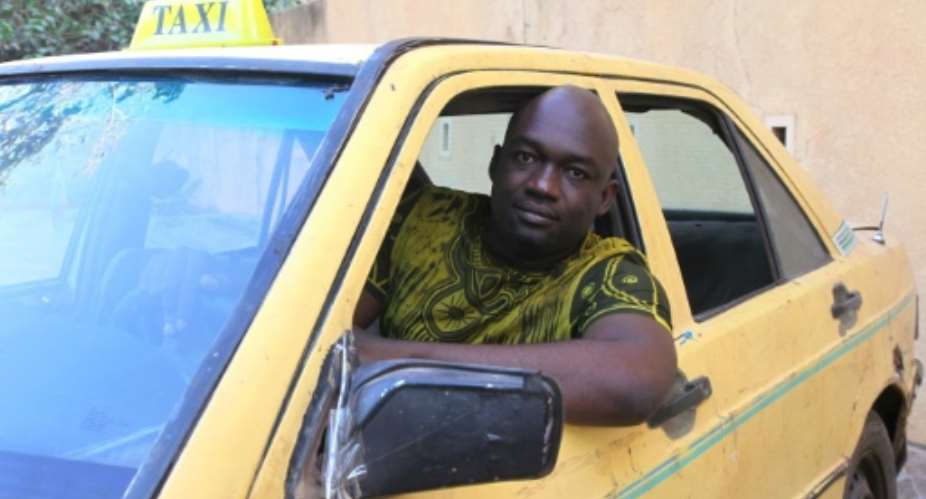Bamako (AFP) - "This taxi is no ordinary taxi," shouts the driver, allowing his customer a moment to settle in the back seat before propelling his cab down the streets of Bamako, talking a mile a minute.
The bombastic declarations of "F-One", a cabbie with tales even taller than the high standard of his profession, have hooked fans of Mali's newest hit TV show, "Taxi Tigui" (Taxi Driver), whose deft mix of satire and social commentary has a distinctly local twist.
Since its launch last month, the series has drawn huge attention, in part because it is 100 percent Malian: Set in the capital, recorded in the local Bambara language and produced in the country with Malian actors.
"People were waiting for this, that's what we discovered with 'Taxi Tigui'," co-creator Toumani Sangare said. "It is really important for us to create content that looks like we do."
Each three-minute episode marks a significant change from the country's usual television diet of dubbed South American soaps, using comedy to delve more deeply into the national psyche.
F-One boasts that his eponymous taxi is "the fastest in Mali", despite surviving bombings in Iraq, war in Afghanistan and an unlikely earthquake in central Paris that killed everyone in the vicinity. Mali's president is of course a regular customer.
So far, so cabbie.
But the zany content often mirrors reality for Bamako's 16 million citizens: F-One and his customers start off arguing about the fare but weave their way around gender politics, romance and the challenges of being a good Muslim.
"It's a caricature of society," said Sangare, a Franco-Malian who acts as a director and producer for "Taxi Tigui". "Each customer is the pretext for a sketch, an adventure," he told AFP.
- 'Rediscovering daily life' -
Sangare teamed up with Frenchman and longtime Bamako resident Nicolas Frebault to cast a satirical eye on the dusty west African metropolis, producing 44 episodes.
Viewers "rediscover daily life in Mali" through laughter, said the show's star Koman Diabate. "Everything that happens around us, whether cultural, economic or political -- we talk about it."
F-One, for example, embraces a pious mood in an episode set on a Friday, traditionally a day dedicated to the mosque in Muslim-majority Mali.
He refuses two would-be clients, shaking his head and running prayer beads through one hand as he explains he is on his way to worship.
When a final customer offers an impossibly large tip to get to a first date on time, F-One abandons all thoughts of Allah to take his amorous client to the girl in question at breakneck speed.
"For sensitive topics, we often flip them around with humour so the taboo disappears amidst the laughter," said Sirafily Django, a "Taxi Tigui" scriptwriter and actor.
- People see themselves -
Mali does not record audience figures but public reaction appears overwhelmingly positive.
"I really liked it, it's what we see every day in Mali," said Marietou Togola, a student who watched the series premiere in Bamako.
Three back-to-back episodes of "Taxi Tigui" are broadcast every Monday to Wednesday by state broadcaster ORTM, then repeated in the morning during the rest of the week.
Typical is TV repairman Modibo Haidara who watched "Taxi Tigui" with his neighbours, saying he fell about laughing over how well Koman and his co-stars brought "the traditions, the reality of Mali" to the small screen.
Even rarer for a Malian show, "Taxi Tigui" was entirely financed through local sources, unlike previous local hits that relied on outside support, said Moussa Ouane, director of Mali's National Cinematography Centre (CNCM).
The show "could not have happened without local support, financially speaking," said Sangare.
Malian cinema has taken such huge blows in recent years that almost all of its public screens have shut, Ouane said, leaving television to fill the gap.
"It is now much easier to produce television series than feature films," he said, and what's more, "people want to see themselves on the screen."





 Former Kotoko Player George Asare elected SRC President at PUG Law Faculty
Former Kotoko Player George Asare elected SRC President at PUG Law Faculty
 2024 elections: Consider ‘dumsor’ when casting your votes; NPP deserves less — P...
2024 elections: Consider ‘dumsor’ when casting your votes; NPP deserves less — P...
 You have no grounds to call Mahama incompetent; you’ve failed — Prof. Marfo blas...
You have no grounds to call Mahama incompetent; you’ve failed — Prof. Marfo blas...
 2024 elections: NPP creates better policies for people like us; we’ll vote for B...
2024 elections: NPP creates better policies for people like us; we’ll vote for B...
 Don’t exchange your life for wealth; a sparkle of fire can be your end — Gender ...
Don’t exchange your life for wealth; a sparkle of fire can be your end — Gender ...
 Ghana’s newly installed Poland train reportedly involved in accident while on a ...
Ghana’s newly installed Poland train reportedly involved in accident while on a ...
 Chieftaincy disputes: Government imposes 4pm to 7am curfew on Sampa township
Chieftaincy disputes: Government imposes 4pm to 7am curfew on Sampa township
 Franklin Cudjoe fumes at unaccountable wasteful executive living large at the ex...
Franklin Cudjoe fumes at unaccountable wasteful executive living large at the ex...
 I'll 'stoop too low' for votes; I'm never moved by your propaganda — Oquaye Jnr ...
I'll 'stoop too low' for votes; I'm never moved by your propaganda — Oquaye Jnr ...
 Kumasi Thermal Plant commissioning: I pray God opens the eyes of leaders who don...
Kumasi Thermal Plant commissioning: I pray God opens the eyes of leaders who don...
